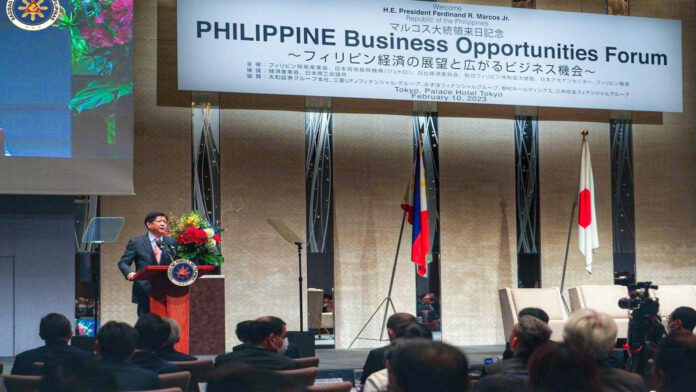The Philippines is a “great” investment destination, President Ferdinand R. Marcos Jr. told Japan’s business community on Friday, as he touted the country’s robust economy.
“The Philippines is a great investment area as it leads economic recovery and performance in the Asia-Pacific Region, in fact, not only in the region but also in the whole world,” Marcos said during a dinner hosted by Japanese financial institutions as he expressed optimism that his five-day working visit to Japan would attract more investments in key sectors in the Philippines.
“We look forward to future projects in the following sectors from both portfolio and foreign direct investors as we are certain that these will materialize into a fair return to both parties.”
He expressed hope that Japanese business leaders would consider investing in the Philippines to help it attain its goal of becoming a “global manufacturing hub for next-generation wiring harnesses, office peripherals, and electronic parts and components.”
He also urged them to partner with the Philippines to upscale its processing of green metals into higher-value products; modernize its food and health sectors; achieve digital transformation through artificial intelligence, biomaterial research and development, and data centers; and establish a “creative economy.”
Marcos said he likewise seeks partnership with Japan for animation and game development.
“We want to venture into partnerships both in business and capacity-building projects in areas for which Japan is recognized as a global leader,” he said.
Marcos made the remarks on the same day Manila and Tokyo, as well as both countries’ private sectors, signed about 35 investment pledges.
Just ‘tip of the iceberg’
The 35 investment deals were signed between the Philippines and Japan, just a day after the two countries inked seven key bilateral agreements.
The business arrangements cover various sectors, among them manufacturing, infrastructure development, energy, transportation, health care, renewable energy, and business expansion.
In an interview in Japan, House of Representatives Speaker Martin Romualdez said the investment pledges were only the “tip of the iceberg.”
“But there’s an offshoot of this, marami pa yan, marami pa nangyayari (there are still many talks happening) off-camera, so to speak, or on the sidelines,” Romualdez said, noting that Japanese investors are “very open” to growing their businesses in the country.
The Filipino people, he said, would benefit from the series of business meetings held during Marcos’ five-day working visit to Japan.
The business matching arranged by the Department of Trade and Industry in Japan for 85 Philippine companies yielded more than 255 meetings with their Japanese counterparts.
“These discussions really redound to the benefit of the Filipino people, through the improvement of the economy, through investments, expansions of business, explorations to new areas and fields, the clarifications of whatever issues the businessmen have brought forth,” Romualdez said.
Potential deals
San Miguel Corp. president and chief executive officer Ramon Ang, who is also in Japan, said many Japanese business leaders have expressed intent to invest in the Philippines because of their “admiration” for Marcos.
Ang, who heads one of the Philippines’ oldest conglomerates, said he is talking with Japanese companies, such as Mitsui, Sumitomo, Taisei, as well as Toyo Engineering for possible deals.
“Hanga sila sa magaling nating Pangulo kaya lahat ng tao gustong mag-invest. Sobra silang hanga sa ating mahal na Pangulo at sabi very energetic, at lahat sila gustong mag-invest (They admire our good President, that’s why all of them want to invest. They really admire our beloved President, and they see him as a very energetic leader),” he said.
“Marami tayong puwedeng gawin. Of course, hinahanapan natin ng magandang deal. Siyempre kailangan mag-invest sila sa atin. Baka tayo pa ang makumbinse na mag-invest sa kanila (We can do so many things. We are looking for a good deal. Of course, they should invest in our country, instead of the other way around).” (PNA)


